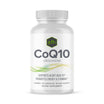When the weather starts to get warmer, people shed their coats and sweaters and thoughts go to getting in shape for swimsuit season. Talk of revving-up metabolism using diet tricks fills the air when, actually, the metabolic status of an individual is, in part, related to the health of their thyroid gland.
Let’s get into the nitty-gritty of this bundle of energy. The thyroid is a small bow shaped gland located in the neck, near the larynx which acts as an important part of our endocrine system. This small gland reacts to iodine and makes a powerful hormone called thyroid stimulating hormone or TSH. This hormone impacts many functions in our body, including temperature regulation, energy levels, brain function, and our metabolic rate. This basal metabolic rate, or BMR, dictates how our body uses energy and other resources. If you perked up at the mention of metabolic rate, it is because many identify the thyroid with speeding up our metabolism when we want to shed pounds. It is interesting to note that there are binding sites on mitochondria for TSH. Mitochondria are responsible for energy generation. This is a fascinating topic and will subject to a separate blog.
Even if you are ready to rev this engine, an over or underactive thyroid function can alter the BMR, which, no matter our good intentions, may outweigh efforts we put in at the gym or dinner table. This can lead to weight and mood fluctuations, as well as certain disorders such as hyperthyroidism, hypothyroidism, Hashimoto’s disease, Grave’s disease, and thyroid cancer.
Although these issues can affect anyone, ladies are particularly unlucky. According to the Thyroid Foundation, a recent Australian study showed that women are more than ten times at risk for getting thyroid disease. It can also affect a woman’s period and cause pregnancy issues.
According to WomensHealth.gov, symptoms of hypothyroid problems can be a slowed down metabolism, feeling cold when others don’t, constipation, muscle weakness, weight gain, joint or muscle pain, depression, thinning hair, fatigue, pale or dry skin. Hyperthyroidism sufferers may find that they have symptoms like rapid heartbeat, sweating, increased sensitivity to heat, difficulty sleeping, an enlarged thyroid, or a goiter, weight loss, anxiety, and brittle hair.
Some see a physician and are treated with medication for these diseases. However, Dana James, a certified nutritionist, reported in MBG Health that eating certain foods can help your thyroid function. Cruciferous vegetables (Brussel sprouts, bok choy, arugula, kale, broccoli) is a smart pick. Brazil nuts which are a good source of selenium are also a good choice. Sea vegetables that contain iodine can help if the thyroid is deficient and maca powder balances the hypothalamus and pituitary hormone glands and also contains zinc, vitamin B, and iron.
Some things to avoid for healthy thyroid function include gluten, which can promote thyroid antibodies. Soy products like the vegan comfort foods made to taste like the real thing: soy burgers, soy cheese, soy meat, can also wreak havoc on the thyroid gland. Of course, iodine levels are an important factor when using nutrition for your thyroid health, and antioxidants, as well, help decrease damaging oxidative stress and keep the thyroid healthy.





















Leave a comment
This site is protected by hCaptcha and the hCaptcha Privacy Policy and Terms of Service apply.